When it comes to landing your ideal bartending position, a standout resume is essential. In 2025, our collection of resume examples for Bartender offers a comprehensive guide to showcasing your skills, experiences, and personality. Unlock the secrets to crafting a compelling resume that not only captures the essence of your bartending expertise but also grabs the attention of hiring managers. Let’s dive in and create a resume that makes you irresistible to employers!
Bartender Resume Examples – Free Download
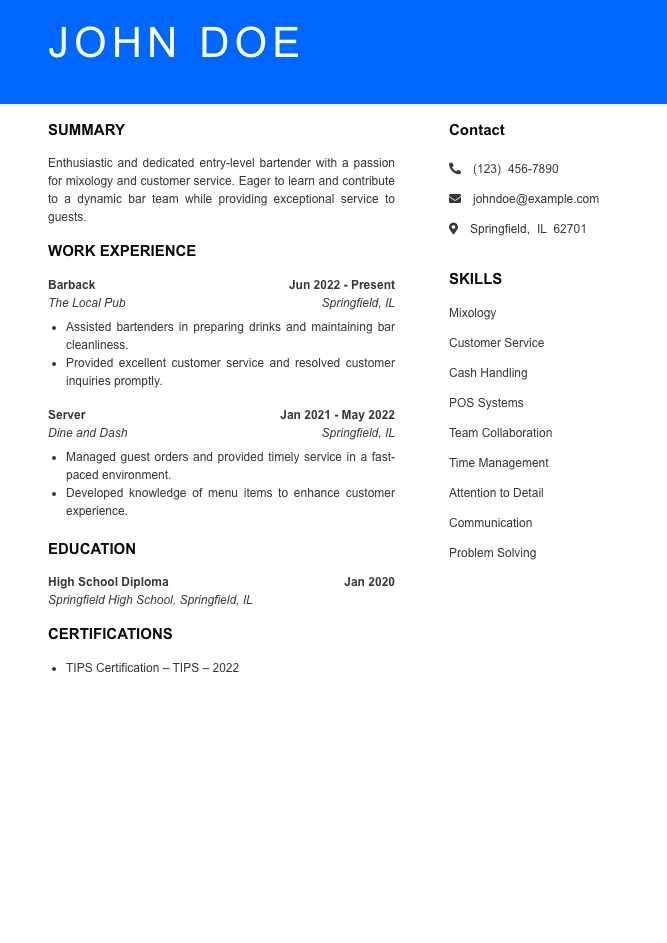

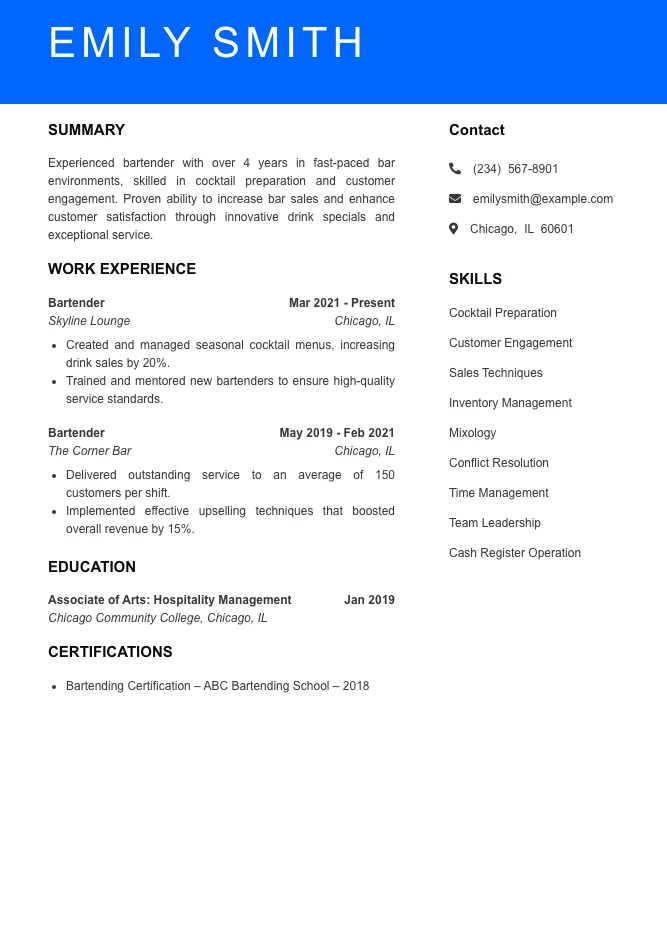
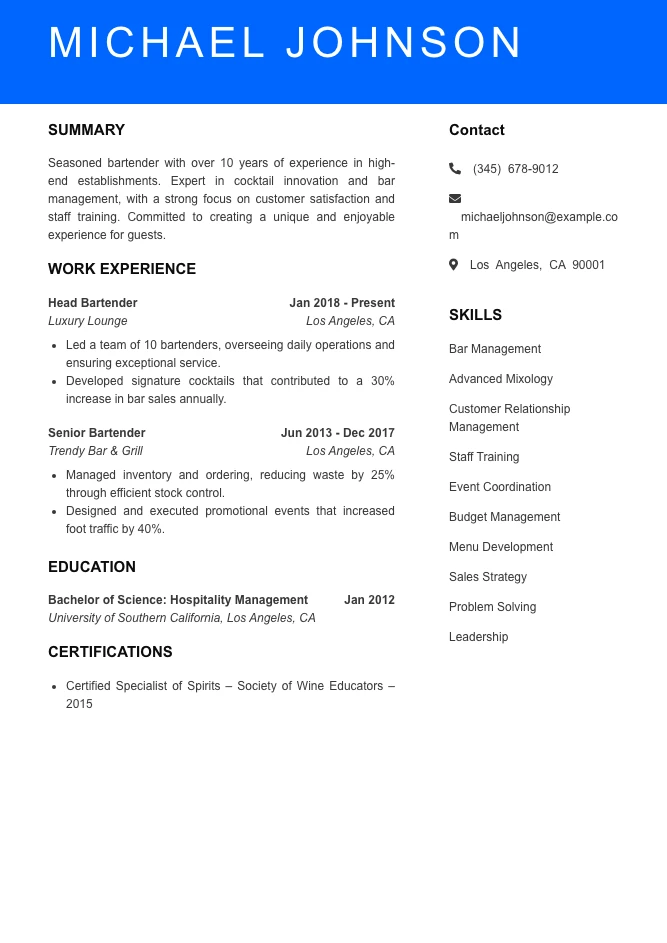
Bartender Resume Examples
Entry Level Bartender Resume Example
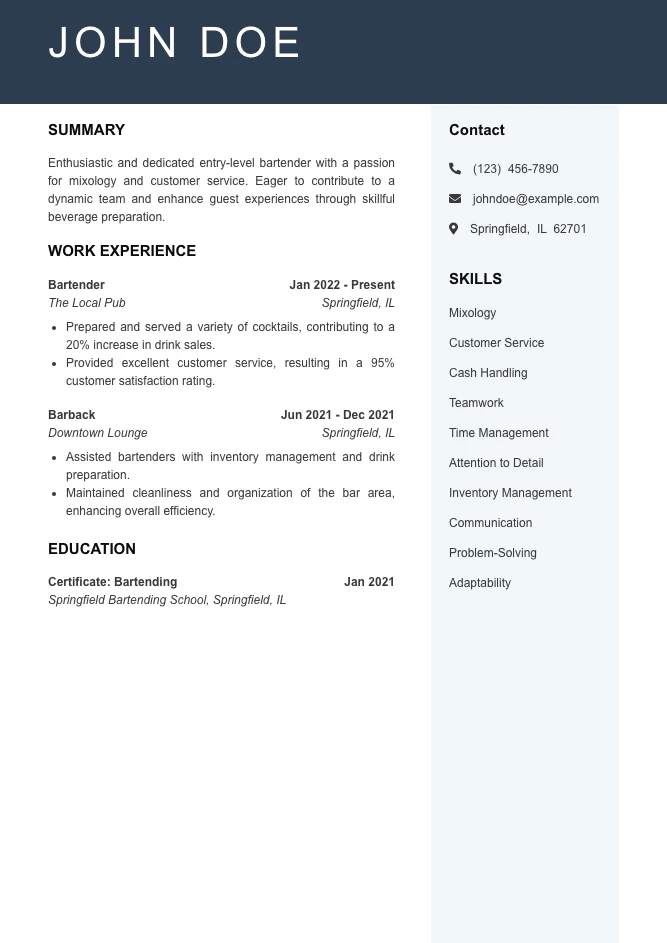
Why This Resume Works
- The summary effectively conveys John Doe’s enthusiasm and dedication, clearly positioning him as an entry-level candidate eager to contribute to a team, which aligns well with potential employer expectations.
- The relevant skills section highlights a well-rounded set of competencies essential for a bartender, showcasing both technical abilities (mixology, cash handling) and soft skills (customer service, teamwork) that are critical in the hospitality industry.
- The work history includes impactful achievements, such as a 20% increase in drink sales and a 95% customer satisfaction rating, demonstrating John’s ability to contribute positively to business outcomes.
- The resume is tailored for an entry-level position, with a clear progression from barback to bartender, indicating professional growth and readiness for increased responsibilities.
- The clarity and tone of the resume are professional and concise, making it easy for hiring managers to quickly assess John’s qualifications and potential fit for the role.
Mid Level Bartender Resume Example
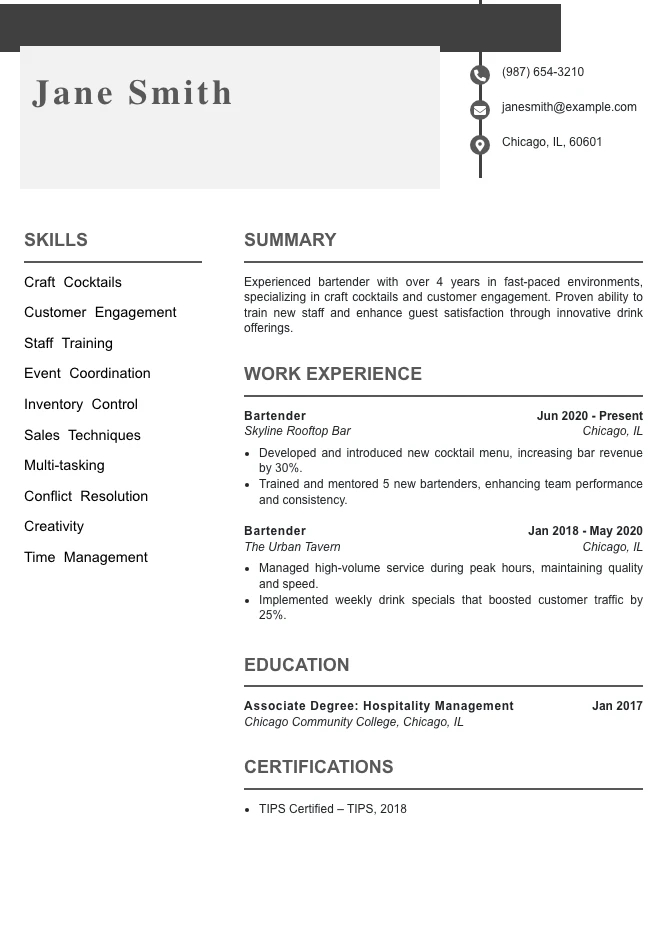
Why This Resume Works
- The summary clearly establishes Jane’s relevant experience and skills, effectively positioning her as a candidate with a strong background in customer engagement and training, which are crucial for a marketing role.
- The skills section highlights both hard and soft skills that are pertinent to marketing, such as creativity and sales techniques, showcasing her versatility and suitability for a marketing manager position.
- Impactful work history reflects measurable achievements, such as increasing bar revenue by 30% and boosting customer traffic by 25%, demonstrating her ability to drive results and contribute to business success.
- The resume suggests a mid-level job fit, with over four years of experience and responsibilities that indicate readiness for increased leadership and strategic roles in marketing.
- The clarity and professional tone of the resume convey confidence and competence, making it easy for hiring managers to assess her qualifications at a glance.
Senior Level Bartender Resume Example
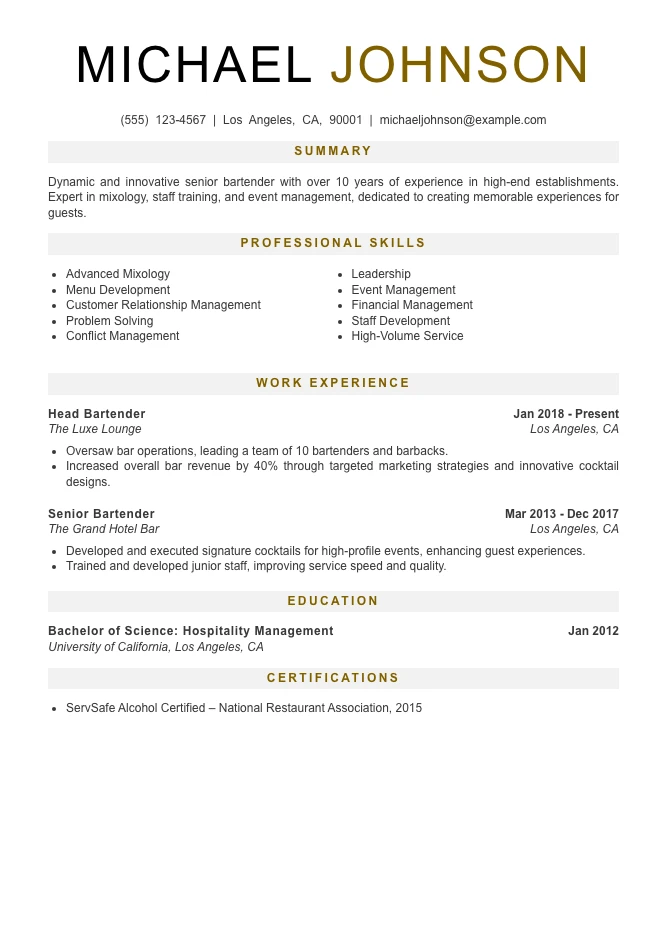
Why This Resume Works
- The summary clearly highlights Michael’s extensive experience and expertise in the hospitality industry, effectively positioning him as a seasoned professional suitable for senior roles.
- Relevant skills such as leadership, event management, and advanced mixology are prominently featured, showcasing his qualifications and ability to contribute to a high-end bar environment.
- The work history demonstrates impactful achievements, including a significant revenue increase and successful event execution, which underscores Michael’s effectiveness in driving business results.
- The resume aligns well with a senior-level position, reflecting both the depth of experience and the leadership roles held, indicating a strong fit for advanced opportunities in the industry.
- The clarity and tone of the resume are professional and engaging, making it easy for hiring managers to quickly assess Michael’s qualifications and potential contributions.
How to Craft a Strong Bartender Resume
A well-crafted resume is essential for any bartender aiming to stand out in a competitive job market. Hiring managers look for specific skills, relevant experience, and a personality that fits their establishment’s vibe. By following this guide, you’ll learn how to effectively highlight your strengths and make a lasting impression on potential employers.
Summary Statement
A strong summary statement is your first opportunity to grab a hiring manager’s attention and set the tone for your resume. This brief section should encapsulate your experience level, any particular specialization you possess, key soft skills, and relevant certifications. Think of your summary as an elevator pitch; it should be confident, tailored, and focused on results.
Key elements to include in your summary: – Years of experience in bartending or hospitality – Types of establishments worked in (e.g., fine dining, nightclubs) – Notable skills, such as mixology, customer service, or event coordination – Any relevant certifications, like bartending school or alcohol service permits
Ensure your tone is confident yet personable, reflecting your unique approach to bartending. A well-written summary not only conveys your qualifications but also gives insight into your personality.
Enthusiastic and customer-focused bartender with a passion for mixology and 1 year of experience in a fast-paced bar environment. Skilled in crafting signature cocktails, providing exceptional customer service, and maintaining a clean and organized workspace.
Mid-Level:
Dynamic bartender with over 5 years of experience in high-volume restaurants and nightclubs. Proven track record of increasing sales through exceptional service and innovative cocktail creations, complemented by a deep knowledge of spirits and beverages.
Skills & Qualifications
When crafting your skills section, it’s essential to include both hard and soft skills that demonstrate your capabilities as a bartender. Core skills might include mixology expertise, beverage knowledge, and cash handling, while soft skills could encompass customer service, communication, and problem-solving.
To identify the most relevant skills to include, analyze job descriptions for bartending positions. Look for recurring phrases and requirements that align with your experience. This approach not only makes your resume more attractive to hiring managers but also ensures it is optimized for Applicant Tracking Systems (ATS).
Key skills to consider adding: – Mixology and cocktail preparation – Customer service excellence – Inventory management – Team collaboration
- Mixology and cocktail preparation
- Customer service excellence
- Inventory management
- Cash handling and point-of-sale systems
- Strong communication skills
- Team collaboration
- Problem-solving
- Time management
Top ATS Keywords for Bartender
Work History
Your work history is where you showcase your experience and achievements. Focus on highlighting relevant roles, particularly those that demonstrate your ability to handle high-pressure environments, manage customer relationships, or lead a team. Use a reverse chronological format to make it easy for hiring managers to see your most recent experience first.
To make your work history impactful: – Use quantified bullet points to illustrate your contributions (e.g., “Increased beverage sales by 20% over three months”) – Highlight leadership roles or responsibilities, especially if you’ve trained new staff or managed inventory
Bartender, The Local Pub, Chicago, IL, June 2022 – Present
– Created unique cocktail recipes, enhancing the drink menu and increasing customer satisfaction
– Managed bar inventory, ensuring optimal stock levels and minimizing waste
– Provided top-notch customer service during busy hours, contributing to a welcoming atmosphere
Mid-Level:
Head Bartender, Elite Lounge, New York, NY, Jan 2018 – Present
– Led a team of 5 bartenders, training staff on mixology techniques and customer service excellence
– Increased beverage sales by 30% through innovative promotions and seasonal menu updates
– Maintained a high standard of cleanliness and organization in a fast-paced environment
Education
While formal education isn’t always a requirement for bartending, it can set you apart in a competitive field. Common educational backgrounds for bartenders include hospitality management degrees or completion of bartending courses. When listing your education, follow a clear format that includes your degree, institution name, location, and graduation year.
Example format: – Degree, School Name, City, State, Graduation Year
Degree, School Name, City, State, Graduation Year
Example:
Diploma in Bartending, ABC Bartending School, Las Vegas, NV, 2021
Additional Sections
Including additional sections on your resume can enhance your candidacy by showcasing certifications, languages, or awards. For bartenders, relevant certifications may include responsible beverage service training or mixology certifications.
Examples of how to format certifications: – TIPS (Training for Intervention Procedures) Certification – National Restaurant Association – 2023 – Mixology Certification – XYZ Bartending School – 2022
- TIPS (Training for Intervention Procedures) Certification – National Restaurant Association – 2023
- Responsible Beverage Service Certification – State of California – 2022
Do’s and Don’ts
To ensure your bartender resume is effective, keep these practical tips in mind:
Do: – Tailor your resume for ATS by using keywords from job postings – Emphasize your impact through quantifiable achievements – Use industry-specific terms to demonstrate familiarity with bartending
Don’t: – Use generic statements that don’t reflect your unique skills – Ignore soft skills, as they are crucial in customer-facing roles – Overuse buzzwords that may dilute your message